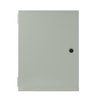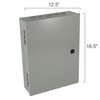Large Relay Panel, (6x) 2-Pole
Relay Panels Description
The RLY-12PL-CC large relay panel is an ultra-silent, power-switching panel suitable for snow melting, slabheating, and roof and gutter deicing applications. Housed in a NEMA 1 indoor enclosure,this large panel is cULus approved and each of the 6 relays in the RLY-12PL-CC are rated for up to 30 Amps. The RLY-12PL-CC panelscan be used with 120, 208, 240 or 277 VAC cables. Comes with 12 poles (six 2-pole pairs) and easy-to-use “push-in” terminals for connecting the leads and power supply.
Learn more about snow melting systems. Perfect for heated driveways, patios, walkways and paths, accessibility ramps, or even stairs.
Specifications
Electrical
| Applicable Voltages | 120 V, 208 V, 240 V, 277 V |
| Connection Method | Hardwired |
| Maximum Current | 30 A |
| Numbers of Poles | 12 |
Product Dimensions
| Depth | 4″ |
| Height | 16.5″ |
| Weight | 15.4 lbs |
| Width | 12.5″ |
Identifiers
| SKU | RLY-12PL-CC-BTK |
| UPC (GTIN-12) | 881308068219 |
Documents & Manuals
Customer Questions & Answers
Relay Panels has 27 Questions and Answers.
How quickly do these systems melt the snow?
That depends on a number of variables (like the temperature outside) but generally speaking these snow melting systems are designed to melt 1" - 3" of snow per hour. Anything above 3" per hour is typically considered blizzard conditions.
24 people found this helpful. Did you find this helpful? Yes NoIs it okay to cut the snow melting cable if it is too long for the application for which it was designed?
May I cross or overlap the WarmlyYours snow melt heating cable?
When installing outdoor WarmlyYours snow melting cables for your driveway, patio, walkway, terrace, stairs, ramp, etc. - NEVER cross, overlap, or allow the heating cables to touch each other. Doing so will quickly cause a circuit failure due to excessive heat build up. Always follow the installation instructions and/or design layout plan to ensure the cable is installed with the correct spacing required for proper operation.
14 people found this helpful. Did you find this helpful? Yes NoHow does the electric snow melting system compare to hot water tubing (hydronic) systems?
The material costs are similar. However, electric systems are easier to install, with fewer components and significantly lower maintenance costs. Electric systems will run for a shorter period of time to give the same level of performance but with much higher energy efficiency (typically 95%-98% efficient). Controls and sensors required for the two types of systems are very similar. Electric systems do not usually require slab insulation and do not create the concerns typically associated with hydronic systems. These concerns include, but are not limited to, return temperatures, flue gas venting, waterway shrinkage and property damage caused by leaking pipes or tubes.
14 people found this helpful. Did you find this helpful? Yes NoDoes the factory splice need to be completely embedded during installation?
View all 27 Questions and Answers








